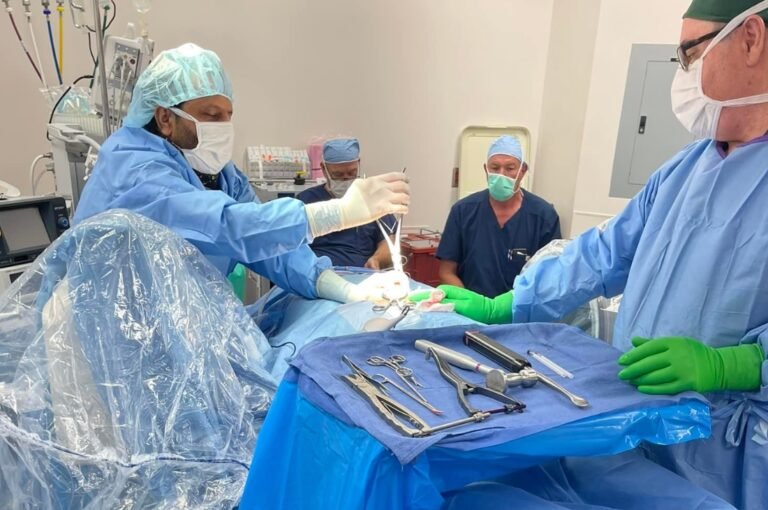Pain in the lower back is usually treatable without surgery. According to the study, 20–40% of back procedures fail to treat pain. This failure is so widespread that it’s called failed back surgery syndrome. Anyway, back surgery is sometimes a good or necessary choice to fix major injuries to the muscles, bones, or nerves. After exhausting all other options, pain management doctors Dallas can advise you on surgery.
What are their Responsibilities?
Pain management specialist in Dallas treat patients with underlying illnesses or long-term surgical complications. Multidisciplinary care is typical for pain management. A team of doctors and specialists may include the following:
- Doctors who handle pain
- Physical and occupational therapists
- Other condition-specific specialists
Pain doctors treat many causes and illnesses. Their purpose is to reduce discomfort. They will prescribe painkillers and treat the problem. To become a doctor, pain management professionals need further training. Some schools demand 12 months of continued training to maintain a doctor’s pain certification.
What Kinds of Pain Do They Treat ?
Multiple types of pain may require further treatment. Any patient who believes their pain requires more than a primary care doctor should request a referral to a pain management doctor in Dallas. Some of the kinds are:
Acute Pain
Rapid onset of acute discomfort. It often results from:
- Blunt injury
- Certain dental work, mild wounds, infections, or burns
- Muscular tension
- Body portion strains
Acute pain is usually random. It disappears within days or months. It normally goes away when the cause is addressed. Untreated, the illness can cause persistent discomfort. Stronger drugs or injections may help relieve discomfort.
Long-Term Discomfort
Chronic pain lasts for months. Chronic pain can range from subtle to devastating. Chronic pain increases healthcare costs and lowers the quality of life. Chronic pain patients see doctors for treatment. They might oversee treatment and suggest other remedies to relieve symptoms.
Neuropathic Pain
Many diseases and accidents can produce neuropathic pain, including:
- Multiple sclerosis, malignancy, and postherpetic neuralgia
- Post-surgery neuropathic pain and diabetic neuropathy
- Injury to the spinal cord
- Stroke
A nerve injury causes neuropathic pain. For initial treatment, doctors may prescribe tricyclic antidepressants, or SNRIs. These drugs may be followed by pregabalin or gabapentin. Tramadol or topical lidocaine (lignocaine) is advised as a second-line therapy. If symptoms improve with other treatments, doctors may prescribe stronger opioids as the third line.
Painful Sensation
Damaged tissue causes nociceptive pain. Causes of pain include burns, wounds, bone fractures, repetitive muscle motions, and joint injuries like arthritis or sprains. Sharp, throbbing, or painful pain can be chronic or abrupt. Nociceptor nerve endings detect pain and injury. They feel nociceptive pain when connective tissue, bones, muscles, and skin are damaged.
Functional Discomfort
Functional pain occurs without evident harm or damage. A person with pain may have symptoms and limitations. Possible functional pain causes:
- Conditions such as IBS, fibromyalgia, persistent chest pain, and TMJ dysfunction can cause widespread discomfort in the body.
- Functional discomfort may also occur in those experiencing psychological suffering, such as stress or traumatic life events. Doctors who treat fibromyalgia or IBS can lessen pain and enhance quality of life.
Other Types
Pain management doctors treat sports injuries, spinal problems, arthritis, muscle, nerve, and soft tissue diseases, as well as migraines. Pain management doctors Dallas address these and more:
- Aspects of degenerative disc disease
- Joint arthritis
- Herniated spinal discs
- Spinal cord inflammation
- Pinched nerves
- Sciatica
- Cervical and lumbosacral radiculitis
- Injuries and muscle discomfort
- Joint pain, arthritis, tendon, and ligament issues
- Complex regional pain syndrome
- Headaches, migraines, and neuropathic pain
Pain medicine specialists must communicate well in multidisciplinary and transdisciplinary contexts. They educate patients, the public, and healthcare professionals on pain processes and evidence-based treatments. Giving patients knowledge and understanding is crucial to pain management.
When is it Advisable to Consult With a Pain Doctor?
Pain is an inevitable part of life for all individuals, with neck and back pain being the most prevalent. Often, simple things like overuse injuries cause this pain. Brief rest, activity moderation, and over-the-counter pain medications often relieve discomfort within days. After two to three weeks of pain management with non-invasive methods like rehabilitation or medications, your doctor may think about sending you to a therapeutic pain medicine expert.
What Kinds of Methods are Used?
Pain medicine specialists employ a variety of treatments, including:
- Pharmacological: The use of analgesics and other painkillers and extra drugs to treat nociceptive, neuropathic, visceral, and other types of long-term pain conditions.
- Pain medication: Specialists may prescribe analgesics that are specifically designed to treat nerve injuries. Analgesics might not help some people with chronic pain, so they might be dropped or stopped to keep them from getting hurt.
- Interventional techniques: Pain medicine specialists may inject muscles, joints, the spine, and nerves to temporarily reduce pain as part of a larger strategy to control the impact of pain on function. Pain medicine specialists may also implant pain-relieving technologies in a small number of chronic pain sufferers, such as spinal cord stimulation and spinal drug delivery systems.
- Therapies: Physiotherapy and occupational therapy enhance strength, flexibility, mobility, and disability. Individual and group support and teaching sessions for hospital-based psychological therapy. This reduces the pain’s impact on mood, well-being, and social relationships.
Conclusion
Pain management doctors Dallas help relieve discomfort. An individual’s pain management therapy strategy includes managing their medications. Medication, medical treatment, physical therapy, alternative therapies, and behavioral therapy are examples. Proper care can relieve pain.



